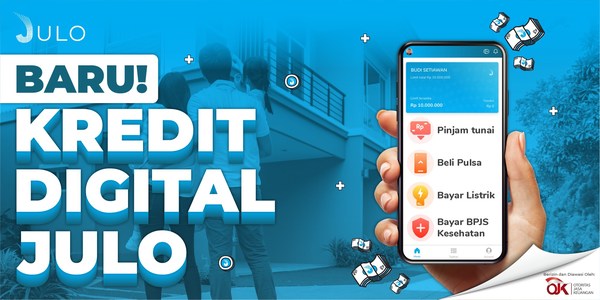Indonesian fintech lending industry has experienced massive growth with a 135% year-on-year increase in total borrowers account, reaching 155 trillion-rupiah disbursement (Financial Services Authority/OJK, December 2020). The rise of fintech peer-to-peer lending has gained much traction among end consumers who see it as an alternative to conventional banking and payment services.
Subscribe to our Telegram channel to get a daily dose of business and lifestyle news from NHA – News Hub Asia!
Indonesian Fintech JULO launches digital credit enables cash and non-cash transaction, including e-commerce payment, utilities bill, phone credit and e-wallet top up.
Digital credit is one of their services which is often sought after by the public. With the advancement of technology, digital credit enables self-service loan-application through mobile phones in a few clicks without visiting and queuing for hours at financial institution offices. Simplicity and easy access become the real advantage for fintech lending players in Indonesia to pursue millions of potential customers across the country, which eventually drive economic growth through financial inclusion.
JULO, a pioneer in Indonesia peer to peer (P2P) lending upgrades its cash loan product to digital credit with a limit up to 15-million-rupiah, equivalent to USD 1,000. JULO believes in responsible lending where it charges 0,1% interest rate/day, lower than other consumer lending players who charge up to 0,8% per day. Given the 47 million underbanked and 92 million unbanked population in Indonesia, JULO sees a huge opportunity to serve these populations to use digital credit nationwide.
Beside regular cash loan, JULO is now equipped with various features that facilitates the user to transact on e-commerce platforms, transfer funds, pay for utilities bills, purchase phone credit, and top up digital wallets. Through this digital credit card, users can choose to pay their transaction in installment mode up to 9 months. For the underserved population, JULO digital credit would significantly help user cashflow especially when it comes to big ticket purchases.
JULO has been fully licensed by the OJK since May 2020 and has obtained ISO 27001: 2013 data security certification as an authorized Indonesian fintech lending. With a vision of driving financial inclusion throughout Indonesia, JULO provides digital credit facilities that are easily accessible and affordable to people who have not had access from conventional banks. JULO encourages people to use loans wisely for activities that encourage self-development, business, and meet their daily needs.
“JULO was established in Indonesia and created for Indonesia. We continue to innovate and improve service quality to serve more people across the country. We hope with JULO’s digital credit, more people will experience the convenience of online credit facilities for cash loans and digital transactions,” said Adrianus Hitijahubessy, CEO and co-founder of JULO.
Currently, JULO has served more than 350,000 customers in 34 provinces across Indonesia, from Aceh to Papua. Moreover, JULO has won various awards at the national and international levels; as the Winner of the Indonesia Fintech Festival (2016), Winner of the UN Fintech Challenge (2018), and Winner of Inclusive Fintech 50 (2019).
JULO’s Head of Marketing, Mikhal Anindita, said, “JULO is committed to providing the best service for customers. In this digital era, JULO is aware of users’ various financial needs. With JULO’s digital credit innovation, we want to provide cash and non-cash credit facilities that are affordable and easily accessible via smartphones. We believe digital credit facilities can be beneficial for Indonesia population when used wisely, not only for consumptive use but also for improving quality of life such as education, house renovations, and healthcare.”



